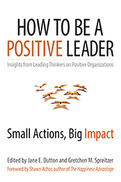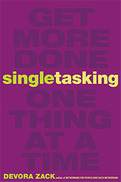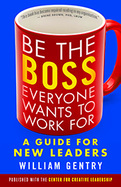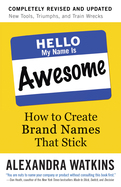Search Results: "Social Venture Networks"
Results 397-402 of 404
Positive leaders are able to dramatically expand their people's—and their own—capacity for excellence. And they accomplish this without enormous expenditures or huge heroic gestures. Here leading scholars—including Adam Grant, author of the bestselling Give and Take; positive organizational scholarship movement cofounders Kim Cameron and Robert Quinn; and thirteen more—describe how this is being done at companies such as Wells Fargo, Ford, Kelly Services, Burt's Bees, Connecticut's Griffin Hospital, the Michigan-based Zingerman's Community of Businesses, and many others. They show that, like the butterfly in Brazil whose flapping wings create a typhoon in Texas, you can create profound positive change in your organization through simple actions and attitude shifts.
Singletasking
2015
Your Mind Can't Be Two Places at Once
Too many of us have become addicted to the popular, enticing, dangerously misleading drug of multitasking. Devora Zack was once hooked herself. But she beat it and became more efficient, and you can too.
Zack marshals convincing neuroscientific evidence to prove that you really can't do more by trying to tackle several things at once—it's an illusion. There is a better way to deal with all the information and interruptions that bombard us today. Singletasking explains exactly how to clear and calm your mind, arrange your schedule and environment, and gently yet firmly manage the expectations of people around you so that you can accomplish a succession of tasks, one by one—and be infinitely more productive. Singletasking is the secret to success and sanity.
Too many of us have become addicted to the popular, enticing, dangerously misleading drug of multitasking. Devora Zack was once hooked herself. But she beat it and became more efficient, and you can too.
Zack marshals convincing neuroscientific evidence to prove that you really can't do more by trying to tackle several things at once—it's an illusion. There is a better way to deal with all the information and interruptions that bombard us today. Singletasking explains exactly how to clear and calm your mind, arrange your schedule and environment, and gently yet firmly manage the expectations of people around you so that you can accomplish a succession of tasks, one by one—and be infinitely more productive. Singletasking is the secret to success and sanity.
Flip Your Script!
You've been promoted to leadership—congratulations! But it's nothing like your old job, is it? William Gentry says it's time to flip your script.
We all have mental scripts that tell us how the world works. Your old script was all about “me”: standing out as an individual. But as a new leader, you need to flip your script from “me” to “we” and help the group you lead succeed. In this book, Gentry supports and coaches you to flip your script in six key areas. He offers actionable, practical, evidence-based advice and examples drawn from his research, his work with leaders, and his own failures and triumphs of becoming a new leader. Get started flipping your script and become the kind of boss everyone wants to work for.
You've been promoted to leadership—congratulations! But it's nothing like your old job, is it? William Gentry says it's time to flip your script.
We all have mental scripts that tell us how the world works. Your old script was all about “me”: standing out as an individual. But as a new leader, you need to flip your script from “me” to “we” and help the group you lead succeed. In this book, Gentry supports and coaches you to flip your script in six key areas. He offers actionable, practical, evidence-based advice and examples drawn from his research, his work with leaders, and his own failures and triumphs of becoming a new leader. Get started flipping your script and become the kind of boss everyone wants to work for.
The ultimate guide to naming your product or business has been updated throughout with twice as many resources as before, new stories (of both hits and flops), and an entirely new chapter on the power of names in the workplace.
Too many new companies and products have names that look like the results of a drunken Scrabble game (Xobni, Svbtle, Doostang). In this entertaining and engaging book, ace-naming consultant Alexandra Watkins explains how anyone—even noncreative types—can create memorable and effective brand names. No degree in linguistics required.
The heart of the book is Watkins's proven SMILE and SCRATCH Test. A great name makes you SMILE because it is Suggestive—evokes something about your brand; is Memorable—makes an association with the familiar; uses Imagery—aids memory through evocative visuals; has Legs—lends itself to a theme for extended mileage; and is Emotional—moves people.
A bad name, on the other hand, makes you SCRATCH your head because it is Spelling challenged—looks like a typo; is a Copycat—similar to competitors' names; is Restrictive—limits future growth; is Annoying—seems forced and frustrates customers; is Tame—feels flat, merely descriptive, and uninspired; suffers from the Curse of Knowledge—speaks only to insiders; and is Hard to pronounce—confuses and distances customers.
This 50 percent–new second edition has double the number of brainstorming tools and techniques, even more secrets and strategies to nab an available domain name, a brand-new chapter on how companies are using creative names around the office to add personality to everything from cafeterias to conference rooms, and much more.
Too many new companies and products have names that look like the results of a drunken Scrabble game (Xobni, Svbtle, Doostang). In this entertaining and engaging book, ace-naming consultant Alexandra Watkins explains how anyone—even noncreative types—can create memorable and effective brand names. No degree in linguistics required.
The heart of the book is Watkins's proven SMILE and SCRATCH Test. A great name makes you SMILE because it is Suggestive—evokes something about your brand; is Memorable—makes an association with the familiar; uses Imagery—aids memory through evocative visuals; has Legs—lends itself to a theme for extended mileage; and is Emotional—moves people.
A bad name, on the other hand, makes you SCRATCH your head because it is Spelling challenged—looks like a typo; is a Copycat—similar to competitors' names; is Restrictive—limits future growth; is Annoying—seems forced and frustrates customers; is Tame—feels flat, merely descriptive, and uninspired; suffers from the Curse of Knowledge—speaks only to insiders; and is Hard to pronounce—confuses and distances customers.
This 50 percent–new second edition has double the number of brainstorming tools and techniques, even more secrets and strategies to nab an available domain name, a brand-new chapter on how companies are using creative names around the office to add personality to everything from cafeterias to conference rooms, and much more.
7 Principles for Finding Meaning in Life & Work
World-renowned psychiatrist Viktor Frankl's Man's Search for Meaning is one of the most important books of modern times. Frankl's extraordinary personal story of finding meaning amid the horrors of the Nazi concentration camps has inspired millions. Frankl vividly showed that you always have the ultimate freedom to choose your attitude—you don't have to be a prisoner of your thoughts.
Dr. Alex Pattakos—who was urged by Frankl to write Prisoners of Our Thoughts—and Elaine Dundon, a personal and organizational innovation thought leader, show how Frankl's wisdom can help readers find meaning in every moment of their lives. Drawing on the entire body of Frankl's work, they identify seven “core principles” and demonstrate how they can be applied to everyday life and work.
This revised and expanded third edition features new stories, practical exercises, applications, and insights from the authors' new work in MEANINGology®. Three new chapters outline how we all can benefit by putting meaning at the core of our lives, work, and society. And a new chapter on Viktor Frankl's legacy illustrates how his work continues to influence so many around the world.
World-renowned psychiatrist Viktor Frankl's Man's Search for Meaning is one of the most important books of modern times. Frankl's extraordinary personal story of finding meaning amid the horrors of the Nazi concentration camps has inspired millions. Frankl vividly showed that you always have the ultimate freedom to choose your attitude—you don't have to be a prisoner of your thoughts.
Dr. Alex Pattakos—who was urged by Frankl to write Prisoners of Our Thoughts—and Elaine Dundon, a personal and organizational innovation thought leader, show how Frankl's wisdom can help readers find meaning in every moment of their lives. Drawing on the entire body of Frankl's work, they identify seven “core principles” and demonstrate how they can be applied to everyday life and work.
This revised and expanded third edition features new stories, practical exercises, applications, and insights from the authors' new work in MEANINGology®. Three new chapters outline how we all can benefit by putting meaning at the core of our lives, work, and society. And a new chapter on Viktor Frankl's legacy illustrates how his work continues to influence so many around the world.
Invisible Martyrs
2018
Farhana Qazi draws on her background as a pioneering counterterrorism professional and a devout Muslim to offer an insider's view of what drives girls and women to join radical Islamic movements and how we can keep them from making this terrible choice.
The first Muslim woman to work for the US government's Counterterrorism Center, Qazi found herself fascinated, even obsessed, by the phenomenon of female extremists. Why, she wondered, would a girl from Denver join ISIS, a radical movement known for its mistreatment of women? Why would a teenage Iraqi girl strap on a suicide bomb and detonate it?
From Kashmir to Iraq to Afghanistan to Colorado to London, she discovered women of different backgrounds who all had their own reason for joining these movements. Some were confused, others had been taken advantage of, and some were just as radical and dedicated as their male counterparts. But in each case, Qazi found their choices were driven by a complex interaction of culture, context, and capability that was unique to each woman.
This book reframes their stories so readers can see these girls and women as they truly are: females exploited by men. Through hearing their voices and sharing their journeys Qazi gained powerful insights not only into what motivated these women but also into the most effective ways to combat terrorism—and about herself as well. “Through them,” Qazi writes, “I discovered intervention strategies that are slowly helping women hold on to faith as they struggle with versions of orthodox Islam polluted by extremist interpretations. And in the process, I discovered a gentle Islam and more about myself as a woman of faith.”
The first Muslim woman to work for the US government's Counterterrorism Center, Qazi found herself fascinated, even obsessed, by the phenomenon of female extremists. Why, she wondered, would a girl from Denver join ISIS, a radical movement known for its mistreatment of women? Why would a teenage Iraqi girl strap on a suicide bomb and detonate it?
From Kashmir to Iraq to Afghanistan to Colorado to London, she discovered women of different backgrounds who all had their own reason for joining these movements. Some were confused, others had been taken advantage of, and some were just as radical and dedicated as their male counterparts. But in each case, Qazi found their choices were driven by a complex interaction of culture, context, and capability that was unique to each woman.
This book reframes their stories so readers can see these girls and women as they truly are: females exploited by men. Through hearing their voices and sharing their journeys Qazi gained powerful insights not only into what motivated these women but also into the most effective ways to combat terrorism—and about herself as well. “Through them,” Qazi writes, “I discovered intervention strategies that are slowly helping women hold on to faith as they struggle with versions of orthodox Islam polluted by extremist interpretations. And in the process, I discovered a gentle Islam and more about myself as a woman of faith.”





















